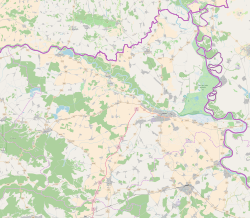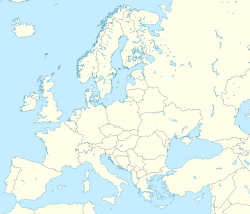Bilje (Hungarian: Bellye) is a municipality in the Baranja region of Osijek-Baranja County, in north-eastern Croatia. It is 5 km northeast of Osijek, on the edge of the Kopački Rit nature park. Prince Eugene of Savoy (1663-1736) constructed a hunting lodge here, Bilje Castle, which later became property of the Teschen branch of the Habsburg family.
Bilje
| |
|---|---|
| Bilje Municipality Općina Bilje | |
 | |
| Coordinates: 45°36′25″N 18°44′38″E / 45.60694°N 18.74389°E | |
| Country | |
| Region | Baranya (Podunavlje) |
| County | |
| Government | |
| • Mayor of Municipality | Željko Cickaj |
| Area | |
| 259.5 km2 (100.2 sq mi) | |
| • Urban | 17.3 km2 (6.7 sq mi) |
| Elevation | 87 m (285 ft) |
| Population (2021)[3] | |
| 4,772 | |
| • Density | 18/km2 (48/sq mi) |
| • Urban | 3,163 |
| • Urban density | 180/km2 (470/sq mi) |
| Time zone | UTC+1 (Central European Time) |
| Website | bilje |

Name
editIts name derived from the Slavic word "bilje" ("herb" in English). In German the village is known as Belje, in Hungarian as Bellye,[4] and in Serbian Cyrillic as Биље. The area occupied by the municipality of Bilje is 260.15 km². [5]
Geography
editThe municipality of Bilje include following settlements and population (2011 census):[6]
- Bilje - 3,613
- Kopačevo - 559
- Kozjak - 69
- Lug - 764
- Podunavlje - 1
- Tikveš - 10
- Vardarac - 630
- Zlatna Greda - 5
Demographics
editAt the 2011 census, there were 5,642 inhabitants in the municipality,[6] including:[7]
- 62.87% Croats
- 29.62% Hungarians
- 3.83% Serbs
- 1.05% Germans
- 0.71% Romani
Politics
editMinority councils
editDirectly elected minority councils and representatives are tasked with consulting tasks for the local or regional authorities in which they are advocating for minority rights and interests, integration into public life and participation in the management of local affairs.[8] At the 2023 Croatian national minorities councils and representatives elections Hungarians and Serbs of Croatia each fulfilled legal requirements to elect 10 members municipal minority councils of the Bilje Municipality.[9]
History
editIn the late 19th and early 20th century, Bilje was part of the Baranya County of the Kingdom of Hungary.
References
edit- ^ Government of Croatia (October 2013). "Peto izvješće Republike Hrvatske o primjeni Europske povelje o regionalnim ili manjinskim jezicima" (PDF) (in Croatian). Council of Europe. p. 34. Retrieved 30 November 2016.
- ^ Register of spatial units of the State Geodetic Administration of the Republic of Croatia. Wikidata Q119585703.
- ^ "Population by Age and Sex, by Settlements" (xlsx). Census of Population, Households and Dwellings in 2021. Zagreb: Croatian Bureau of Statistics. 2022.
- ^ "Registar Geografskih Imena Nacionalnih Manjina Republike Hrvatske" (PDF). Archived from the original (PDF) on 2013-10-29. Retrieved 2013-03-08.
- ^ "Page". bilje.hr (in Croatian). Retrieved 2023-04-10.
- ^ a b "Population by Age and Sex, by Settlements, 2011 Census: Bilje". Census of Population, Households and Dwellings 2011. Zagreb: Croatian Bureau of Statistics. December 2012.
- ^ "Population by Ethnicity, by Towns/Municipalities, 2011 Census: County of Osijek-Baranja". Census of Population, Households and Dwellings 2011. Zagreb: Croatian Bureau of Statistics. December 2012.
- ^ "Manjinski izbori prve nedjelje u svibnju, kreću i edukacije". T-portal. 13 March 2023. Retrieved 2 May 2023.
- ^ "Informacija o konačnim rezultatima izbora članova vijeća i izbora predstavnika nacionalnih manjina 2023. XIV. OSJEČKO-BARANJSKA ŽUPANIJA" (PDF) (in Croatian). Državno izborno povjerenstvo Republike Hrvatske. 2023. p. 19. Archived from the original (PDF) on 3 June 2023. Retrieved 3 June 2023.




